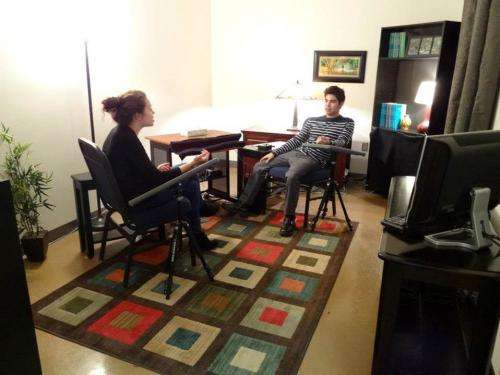How an individual's immune system responds to psychological stressors

(Medical Xpress)—When we fight with a romantic partner and our stress levels rise, we know our fear is based on emotion and that the only real threat we face is the possibility of a wounded heart.
But to our bodies, the threat can seem as real as an approaching lion, which sets into motion a response that could have long-term impacts on our health.
Rebecca Reed, a doctoral candidate in family studies and human development in the University of Arizona College of Agriculture and Life Sciences, is studying how a couple's recovery from an argument affects their immune systems and overall health. Her research findings could apply to any close relationship where there is emotional involvement between partners, including parent-child relationships, siblings, friendships and co-workers.
Reed's research is at the intersection of health, close relationships and emotion regulation. Categorized as "psychoneuroimmunology," it's a study of how psychology – in this case, people's psychological response to a stressful interaction with an intimate partner – activates neurons in the brain to ultimately affect functioning of the immune system.
When a person perceives a threat, his or her body mounts an almost instantaneous stress response, releasing hormones and immune biomarkers that issue a "call to arms" to the body's immune cells in case the person is attacked and injured, Reed explained.
It's important that immune activity decreases after a stressful incident, she said, because a heightened immune response for an extended period of time is stressful on the body's systems and strongly correlates with a number of chronic illnesses, including cardiovascular disease, diabetes, obesity and even some cancers.

Though we hopefully know the difference, our bodies' immune responses don't differentiate between a peeved lover and a predatory lion. When confronted with a psychological stressor, such as a tense discussion or giving a public speech, our immune systems respond the same as they would for an impending physical attack.
"When we give a public speech or have an argument with a loved one, our immune system responds to that," Reed said. "But a really critical part of the process is to recover afterwards and to decrease your immune response when it's no longer needed."
Essentially, too much psychological stress literally can make you sick, while the ability to recover from stressful situations may decrease risk of chronic illness and improve overall health and quality of life.
Reed's research project, Couples' Healthy Immune and Emotions Study, is investigating the way couples' immune systems respond to and recover from emotionally stressful encounters.
Reed studies couples for five days, during which the participants collect swabs of their own saliva four times each day and keep a diary of their daily activities and associated emotions, which Reed uses to map out the couples' emotions and stressors during the study days.
Reed measures variations in one immune biomarker called Interleukin 6, or IL-6, in the individuals' saliva. "Higher IL-6 is a proxy for a more activated immune response," she said. "It's one of the most studied biomarkers in our field because it's very sensitive to psychological stimuli."
"Biomarkers like IL-6 have a diurnal rhythm, meaning that they change over the course of the day," Reed explained. "Days one and two are baseline days, where we capture the normative diurnal rhythm. On day three the couples come into the lab and experience a controlled stressor, in which they talk about an area of disagreement in their relationship. That stressor is meant to activate their immune system. Then we capture the recovery phase during days 4 and 5."
The project examines how partners experience stressors and how they recover both emotionally and immunologically, she explained. "Part of the purpose is to understand how to reliably measure immune recovery with psychological stressors. We know that acute stressors may induce immune effects 24 hours later, but we don't know how long it takes for individuals to recover, and what interpersonal processes may facilitate faster recovery."
Reed also is looking at interpersonal dynamics between couples that may aid immune recovery from an argument or other sources of psychological stress.
She believes that one way to turn off the immune response may be for couples to foster effective interpersonal communication with attention to each other's emotional states. This could help them not only emotionally recover from stressors, but also immunologically recover, she said.
"None of us exist in a vacuum," Reed explained. "Close relationships have very significant effects on health. Our research is moving beyond the individual, to study people within their social systems."
More information: Reed is looking for couples to participate in her five-day study through July. Nonsmoking couples who have been together for more than six months are older than 21 can contact her to volunteer.
















